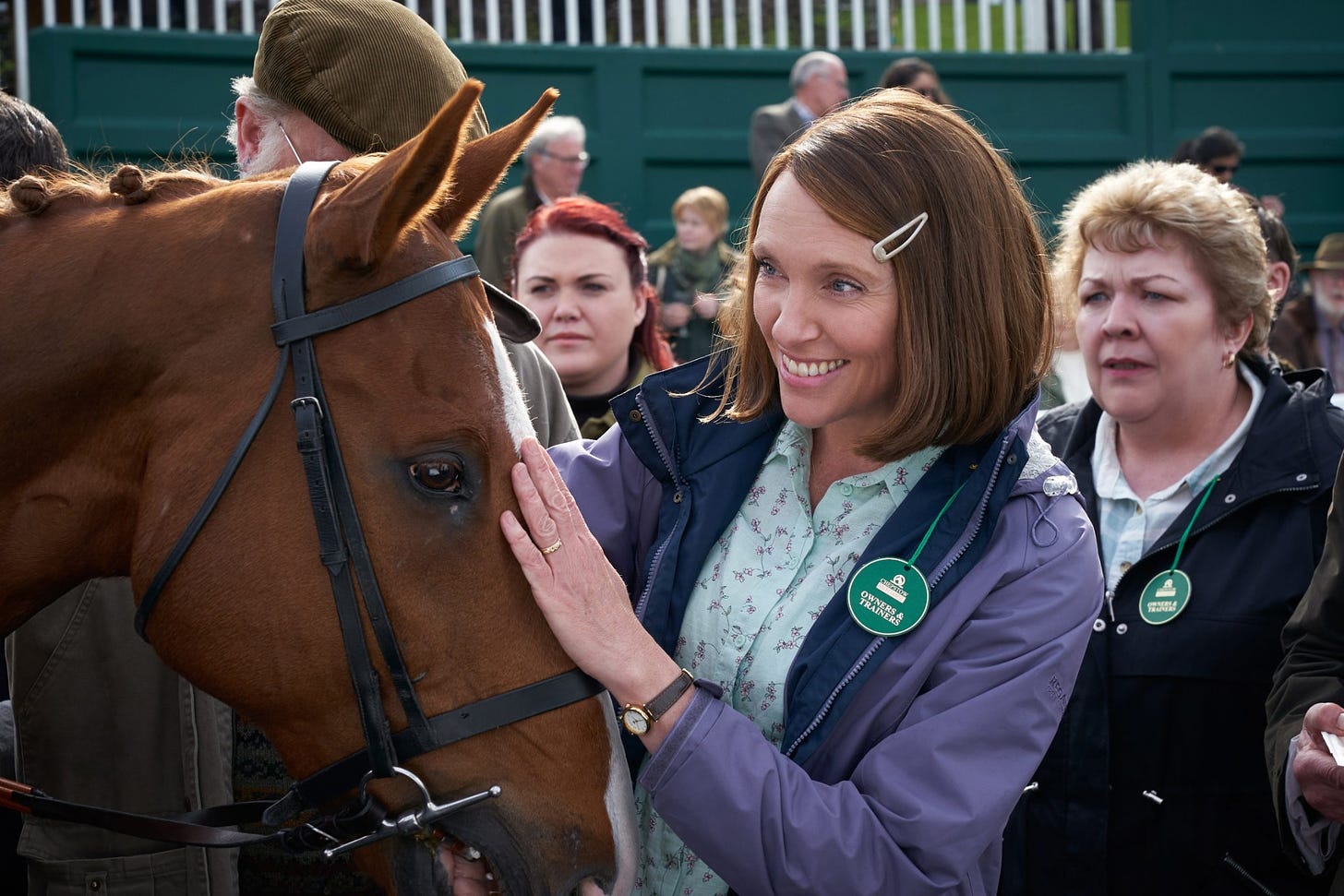Dream Horse
This based-on-true story of a bunch of working-class Welsh folk who bred a racehorse doesn't break any molds, but fits comfortably into the one it has chosen.
"Dream Horse" belongs to a very specific and heretofore unlabeled genre that I will now attempt to name: the British Communal Feelgooder. Like "Calendar Girls" and "The Englishman Who Went Up a Hill But Came Down a Mountain," these are movies about commonfolk Brits in a particular town or group getting together to do something unusual and noteworthy.
The tone is uplifting, though invariably tinged with sad undertones, final acts needing challenges to overcome and all that. Such movies have a few key characters surrounded by a rich ensemble of supporting players and "types" -- the crotchety oldster, the impressionable youngster, the middle-age burnout, the penny-pinching naysayer, and so on.
For some reason, you don't really see equivalent movies from America or other nationalities, it being a peculiarly English thing. Though I should amend that to say United Kingdom to encompass all the islands, as my forefathers would roll in their graves if this (half) Welshman inadvertently lumped the Taffy-folk in with Londoners.
This movie has the benefit of being based on the true story of a bunch of small-town working-class Welsh folk creating a syndicate to breed a racehorse. Their product, Dream Alliance, would go on to gallop beyond their wildest hopes, winning important races and putting the stuffy noblemen who rule the sport in their place.
Truly inspiring stuff -- and no, I'm not giving away anything you didn't already know, because if the horse had turned out to be a plodder they wouldn't have made this movie. It's the same reason they don't make films about William Wallace's fourth cousin, the blacksmith who passed out drunk and drowned in his soup.
(Yes I made that up, but it could've happened, and the point is no one would've remembered if it did.)
The great Toni Collette plays Jan Volkes, a woman of early-middle years whose daily existence is one of toil and unappreciation. She works dawn to dusk, cleaning the floors and working the till at the grocery and helping out her aged parents, and then she works some more tending bar at the local pub well into the night.
Jan isn't so much unhappy as living life in a limbo without joy or tragedy, one day very much the same as the next. She's an empty-nester who needs something to direct the rest of her life.
Her husband, Brian (Owen Teale), is well-meaning but stuck in a rut, having lost his job long ago due to arthritis and a new one having never turned up. He sits in front of the telly all day watching farming shows, which allows him to recall his youthful endeavors and criticize the TV people for doing it all wrong. Brian resembles a great owl mixed with a bear, missing a lot of hair and teeth, but still has a twinkle behind his spectacles and likely was strapping in his day.
One night Jan overhears a local tax advisor, Howard (Damian Lewis), talking about a horse syndicate he was involved in. It didn't go anywhere but it sounds like fun to her. She spends months doing research, buys a promising mare on the cheap, has Brian fix up their garage into a suitable stable and advertises around town for those who want to join the syndicate, putting in £10 a week apiece to save up for the stud and training fees.
I won't go too much into the background characters, because frankly their job is to each provide a little bit of color and support the main characters, which are Jan and Howard.
There is an older woman, a young twerp, some business associates of Howard's, the corner baker, and so on. The only one that makes a strong impression, by design, is Kerby (Karl Johnson), the local drunk, hanger-on and designated comic relief. He gets a fun scene where he divides up his spending money into jars, with the two biggest being "beer" and "horse."
Jan's journey is pretty obvious -- she's a mousy, hardworking woman who has buried her dreams, or even the notion of having a dream, to serve others and decides she needs to grasp for a sense of hope again. Howard's is a little harder to see at first, though we eventually meet his wife (Siân Phillip) and learn about some problems he had in the past that suggest maybe horse-racing shouldn't be his passion.
The racing action is well-staged and thrilling, but doesn't eat up a ton of screen time, and Dream Alliance actually disappears for long stretches of a movie that puts its emphasis squarely on the people. It's mostly hurdles tracks, and the moments when the horses leap blindly over contrived fences and then must come down solidly on their hooves again are highly nerve-wracking, for good reason.
Director Euros Lyn and screenwriter Neil McKay deliver a well-paced, entertaining family picture that doesn't break any molds but fits comfortably into the one it has chosen.
We don't see a lot of these movies, which is probably good because things would feel a bit syrupy if we had British Communal Feelgooders as often as we do robot flicks or romcoms. And I know it's not a particularly great name, but it is the best one anybody's come up with, which is a benefit of being the only pony in the race.





